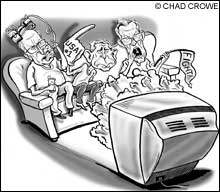 On the morning of March 8, viewers had their first sip of coffee to a grisly sight on the news shows: grainy video of roughly two-dozen dead Iraqis lined up in a makeshift morgue, many of them apparently bound and strangled.
On the morning of March 8, viewers had their first sip of coffee to a grisly sight on the news shows: grainy video of roughly two-dozen dead Iraqis lined up in a makeshift morgue, many of them apparently bound and strangled.
Before the day was done, there was news of more internecine mayhem: the kidnapping by gunmen of roughly 50 employees of a security firm in Baghdad. That evening, even the Bush-friendly Fox News Channel had trouble putting a sunny spin on events, displaying in its reporting a collage of smoldering debris, burning vehicles, US troops firing at an unseen enemy, and the lifeless bodies of strangulation victims. When Fox aired a brief sound bite from a US officer downplaying fears of “chaos” and expressing “optimism,” viewers could only wonder what war he was talking about.
On the eve of the third anniversary of the conflict, American news consumers are being bombarded with numbing images of daily carnage in Iraq — particularly following the February 22 attack on the Askariya shrine in Samarra. As a result, a battery of recent polls reveal that the public has seriously soured — perhaps to the point of no return — on a war that is unpopular, unpalatable, and increasingly viewed as an unwinnable Bush blunder.
What is happening here is not exactly the much ballyhooed “CNN Effect,” which holds that the instant transmission of violence and bloodshed can quickly galvanize popular opinion and force policymakers to respond. (The CNN Effect prototype was the US withdrawal from Somalia following footage of a US serviceman’s body being dragged through Mogadishu.)
Instead, the war in Iraq has been a long grinding struggle, complete with twists and turns that have caused vacillations in public support and expectations. And there have been no significant policy changes from an administration determined to preach the gospel of good news in the face of considerable evidence to the contrary.
As the brutal onslaught of chaos and bloodshed in Iraq steadily erodes Americans’ patience, a number of pollsters and analysts assert that those blaming the media for instilling defeatism in the American public — in a reprise of the so-called Vietnam syndrome — are wrong on two key counts.
For one thing, they say, the track of the media’s performance in Iraq suggests that coverage, rather than being inalterably negative, has focused on both the upbeat (such as elections) and the downbeat (such as violence), as events have dictated. And second, the evidence suggests that the American vox populi is genuinely responsive to actual events as they unfold on the ground.
On Monday, in another of his repeated attempts to reverse the slide of support for his policy, George Bush gave a speech that discussed a “hopeful future” in Iraq and told Americans that despite “images of violence and anger and despair,” the Iraqi people have opted for “a future of freedom and peace.”
But Frank Newport, editor in chief of the Gallup poll, suggests that at this point the president is in the position of basically asking the public not to believe its eyes.